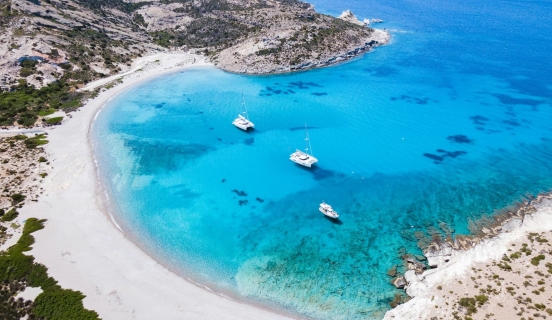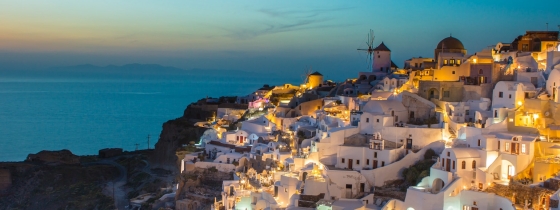Heraklion (Kreta) Weather and Climate: A Comprehensive Guide
Heraklion (Crete) has a Mediterranean climate, influenced by the Mediterranean Sea. Summers are pleasantly warm and very dry. The warmest month of the year is August, with a warm average temperature of 30°C. The sea breeze, usually constant during hot days, helps cool everything down. The ocean has the warmest temperature in August, averaging 26°C. The sunniest month is July, with 372 hours of sunshine per month, which is also the driest, with only 5 mm of precipitation.
It is much colder during the winter periods and reaches its minimum in January at an average of 15°C. The lowest water temperature is approximately 17°C the end of winter in March. This season is also considerably wetter, with January receiving approximately 86 mm and being the wettest month. December is the sunniest month with only 117 hours of sunshine. Despite its dryer summer, Crete is still a relatively green island because the autumn, winter, and spring months together bring good amounts of rainfalls amounting to an average annual total of 519 mm.
Average maximum day and minimum night temperature
In Heraklion (Kreta), temperatures differ significantly between summer and winter months. On average, daytime temperatures range from a comfortable 30°C in July to a moderate 15°C in February.
Nighttime temperatures can drop, with average lows reaching 9°C in February. Check out our detailed temperature page for more information.Temperature ranges by month
Precipitation and rainy days
On average, Heraklion (Kreta) receives a reasonable amount of rainfall, with an annual precipitation of 520 mm. The seasons in Heraklion (Kreta), bring significant changes in precipitation. The wettest month, January, receives moderate rainfall, with an average of 86 mm of precipitation. This rainfall is distributed across 12 rainy days. In contrast, the driest month, July, experiences much less rainfall, totaling 4.5 mm over a single rainy day. These distinct seasonal differences provide diverse experiences throughout the year. For more details, please visit our Heraklion (Kreta) Precipitation page.The mean monthly precipitation over the year, including rain, hail and snow
Sunshine over the year
In Heraklion (Kreta), summer days are longer and more sunny, with daily sunshine hours peaking at 12.4 hours in July. As the darker season arrives, the brightness of the sun becomes less. December sees a soft sun for only 3.9 hours per average day. Visit our detailed sunshine hours page for more information.Monthly hours of sunshine
Daily hours of sunshine
Average water temperature
The mean water temperature over the year ranges from 17°C in February to 26°C in August.
Water temperature over the year
Average humidity
The relative humidity is high throughout the year in Heraklion (Kreta).
The city experiences its highest humidity in January, reaching 68%. In June, the humidity drops to its lowest level at 57%. What does this mean? Read our detailed page on humidity levels for further details.
Relative humidity over the year
Average wind speed
The mean wind speed over the year ranges from 1 m/s in May and June to 2 m/s in January, February, March, April, July, August, September, October, November and December.
The mean monthly wind speed over the year (meters per second)
partly cloudy and chance of rain clear and no rain broken clouds and small chance of slight rainForecast for Heraklion (Kreta)
Select a Month of Interest
Check the conditions for any month of the year.
The best time of year to visit Heraklion (Kreta) in Greece
During the months of April, May, October and November you are most likely to experience good weather with pleasant average temperatures that fall between 20°C and 26°C.Other facts from our historical weather data:
Yes, the months of June, July and August are very dry.
August has an average maximum temperature of 30°C and is the warmest month of the year.
The coldest month is February with an average maximum temperature of 15°C.
January tops the wettest month list with 86 mm of rainfall.
July is the driest month with 5 mm of precipitation.
July is the sunniest month with an average of 372 hours of sunshine.
No idea where to travel to this year? We have a tool that recommends destinations based on your ideal conditions. Find out where to go with our weather planner.




